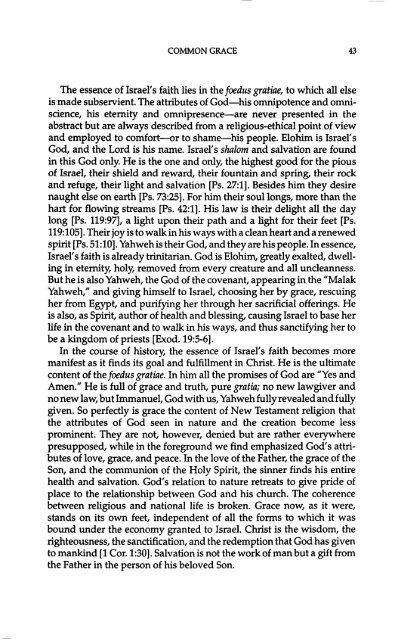Herman-Bavinck-Common-Grace
Create successful ePaper yourself
Turn your PDF publications into a flip-book with our unique Google optimized e-Paper software.
COMMON GRACE 43<br />
The essence of Israel's faith lies in the foedus gratiae, to which all else<br />
is made subservient. The attributes of God—his omnipotence and omniscience,<br />
his eternity and omnipresence—are never presented in the<br />
abstract but are always described from a religious-ethical point of view<br />
and employed to comfort—or to shame—his people. Elohim is Israel's<br />
God, and the Lord is his name. Israel's shalom and salvation are found<br />
in this God only. He is the one and only, the highest good for the pious<br />
of Israel, their shield and reward, their fountain and spring, their rock<br />
and refuge, their light and salvation [Ps. 27:1]. Besides him they desire<br />
naught else on earth [Ps. 73:25]. For him their soul longs, more than the<br />
hart for flowing streams [Ps. 42:1]. His law is their delight all the day<br />
long [Ps. 119:97], a light upon their path and a light for their feet [Ps.<br />
119:105]. Their joy is to walk in his ways with a clean heart and a renewed<br />
spirit [Ps. 51:10]. Yahweh is their God, and they are his people. In essence,<br />
Israel's faith is already trinitarian. God is Elohim, greatly exalted, dwelling<br />
in eternity, holy, removed from every creature and all uncleanness.<br />
But he is also Yahweh, the God of the covenant, appearing in the "Malak<br />
Yahweh," and giving himself to Israel, choosing her by grace, rescuing<br />
her from Egypt, and purifying her through her sacrificial offerings. He<br />
is also, as Spirit, author of health and blessing, causing Israel to base her<br />
life in the covenant and to walk in his ways, and thus sanctifying her to<br />
be a kingdom of priests [Exod. 19:5-6].<br />
In the course of history, the essence of Israel's faith becomes more<br />
manifest as it finds its goal and fulfillment in Christ. He is the ultimate<br />
content of the foedus gratiae. In him all the promises of God are "Yes and<br />
Amen." He is full of grace and truth, pure gratia; no new lawgiver and<br />
no new law, but Immanuel, God with us, Yahweh fully revealed and fully<br />
given. So perfectly is grace the content of New Testament religion that<br />
the attributes of God seen in nature and the creation become less<br />
prominent. They are not, however, denied but are rather everywhere<br />
presupposed, while in the foreground we find emphasized God's attributes<br />
of love, grace, and peace. In the love of the Father, the grace of the<br />
Son, and the communion of the Holy Spirit, the sinner finds his entire<br />
health and salvation. God's relation to nature retreats to give pride of<br />
place to the relationship between God and his church. The coherence<br />
between religious and national life is broken. <strong>Grace</strong> now, as it were,<br />
stands on its own feet, independent of all the forms to which it was<br />
bound under the economy granted to Israel. Christ is the wisdom, the<br />
righteousness, the sanctification, and the redemption that God has given<br />
to mankind [1 Cor. 1:30]. Salvation is not the work of man but a gift from<br />
the Father in the person of his beloved Son.



